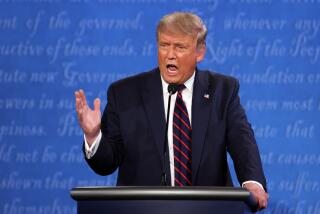‘Freedom for the Thought That We Hate’ Should Have Guided Shultz on Arafat
- Share via
When the United States offered its shores as the most benign environment for a new United Nations organization in the post-World War II era, we did so in part because of our democratic ideal of free speech, our belief in the value of ideas freely exchanged and openly debated.
But now, more than four decades later, we learn that the secretary of state retains an absolute veto over that democratic ideal. Because he is opposed to terrorism, Secretary of State George P. Shultz has unilaterally decided that Yasser Arafat should not be permitted to enter the United States to address the United Nations.
Most of us are also opposed to terrorism (although some of our Third World “friends,” including some strongly supported by Shultz, have practiced it on their own people). We are also opposed to fascism and communism. And, like it or not, our Supreme Court has ruled on more than one occasion that both these “isms” have the right to present their points of view to the American public so long as they don’t advocate the violent overthrow of our government.
Once more it must be said: Yasser Arafat is a disagreeable fellow, and the practices of his organization are deplorable. But that is not the issue. The issue is freedom of speech at the international forum most dedicated to communication and negotiation in the nation most committed to those principles and ideals. The issue also is whether one public official, albeit a powerful one, has the unilateral right to decide who can and cannot speak at the United Nations.
Shultz’s case is given away by his department’s announcement that representatives of the Palestine Liberation Organization already in the United States can speak for their cause at the United Nations. So it’s not the PLO that should not be heard, according to Shultz. It’s Arafat.
Now the Palestinian people have a right to be heard, and they have a cause and a grievance--some think a serious one. Most of them seem to want the PLO to represent their point of view, and the PLO has, at least for some time, seemed to want Arafat to speak for it. So let’s not let Shultz, ostensibly on our behalf, stand in the U.N. doorway like some latter-day George Wallace deciding for us (or perhaps merely for himself) who may speak and who may not.
We hold open the hope of redemption for all. And I for one would like to know whether Arafat and his organization might have something new, something truly generous, to say to the people of Israel and the community of nations.
More to the point, it was Oliver Wendell Holmes who noted in United States vs. Schwimmer: “If there is any principle of the Constitution that more imperatively calls for attachment than any other, it is the principle of free thought--not free thought for those who agree with us but freedom for the thought that we hate.” Although in the strictest sense Arafat does not qualify for our constitutional protection, we strike a powerful blow for democratic ideals by permitting speech that we may deplore on the world’s platform and, at the same time, challenging the speaker to break with the policy of confrontation and offer to meet the people of Israel at least halfway.
In the turbulent sea of human conflict there must always be an island of reason and discourse. It was the ideal of our nation’s founders that America would be that island. Shultz does not strengthen that ideal by making us an island only for ideas with which we agree.
Ideas have power. But their power is directly related to their integrity. If Arafat’s ideas lack integrity, we need not fear them. Put him on the U.N. stage and let the world judge him for what he is and us for what we are--the best defenders of democracy and freedom of speech.
More to Read
Sign up for Essential California
The most important California stories and recommendations in your inbox every morning.
You may occasionally receive promotional content from the Los Angeles Times.













